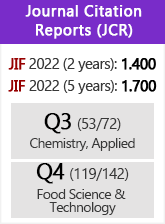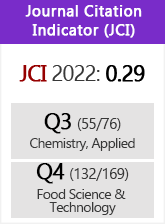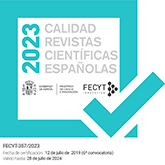Olive oil and haemostasis
DOI:
https://doi.org/10.3989/gya.2004.v55.i1.147Keywords:
Olive oil, Monounsaturated fatty acids, Haemostasis, Factor VII, Platelets, Phenolics, Fibrinolysis, Mediterranean dietAbstract
Olive oil is a key component of the traditional Mediterranean diet; a diet that may explain the low rate of cardiovascular disease (CVD) in Southern European. (Extra virgin) Olive oil is a good source of monounsaturated fatty acids (MUFA) and phenolic compounds, both of which have been investigated for their effects on plasma lipids and lipoproteins, measures of oxidation and factors related to thrombosis. This issue aims to summarise the current understanding of the effects of such dietary components on the haemostatic system and subsequent risk of CVD. To date, evidence suggests that diets rich in MUFA and thus in olive oil attenuate the thrombotic response via a reduction in platelet aggregation and in postprandial FVII levels. Thrombosis is a key event in causing heart attacks and strokes, which if modulated by diet could pose a cost-effective way of reducing CVD incidence in populations that adhere to MUFA/olive oil-rich diets long-term.
Downloads
Download data is not yet available.
Downloads
Published
2004-03-30
How to Cite
1.
Kelly CN, Miller GJ, Williams CM. Olive oil and haemostasis. Grasas aceites [Internet]. 2004Mar.30 [cited 2024Jul.27];55(1):52-65. Available from: https://grasasyaceites.revistas.csic.es/index.php/grasasyaceites/article/view/147
Issue
Section
Monography
License
Copyright (c) 2004 Consejo Superior de Investigaciones Científicas (CSIC)

This work is licensed under a Creative Commons Attribution 4.0 International License.
© CSIC. Manuscripts published in both the printed and online versions of this Journal are the property of Consejo Superior de Investigaciones Científicas, and quoting this source is a requirement for any partial or full reproduction.All contents of this electronic edition, except where otherwise noted, are distributed under a “Creative Commons Attribution 4.0 International” (CC BY 4.0) License. You may read here the basic information and the legal text of the license. The indication of the CC BY 4.0 License must be expressly stated in this way when necessary.
Self-archiving in repositories, personal webpages or similar, of any version other than the published by the Editor, is not allowed.
















